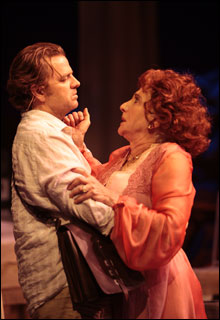
GEORGIA VIA LOWELL: Olympia Dukakis sinks her teeth into Flora Goforth. |
Who knew the azure waters off the Amalfi Coast flowed into the River Styx? They do in The Milk Train Doesn’t Stop Here Anymore, the underappreciated tragicomic allegory that in the early 1960s began Tennessee Williams’s long and demoralizing Rodney Dangerfield period — during which, trying to jump off the Streetcar everyone expected, he experimented with other forms, often garnering little respect. Milk Train, with which the playwright struggled through several revisions, is recognizably a Tennessee Williams play, with its rapacious old dowager, handsome young drifter, affected lyricism, and tug-of-war between flesh and spirit. But elements of surrealism, expressionism, even kabuki and The Madwoman of Chaillot, float in its Italianate stew — whose principal ingredient refuses to give up the ghost and jump into the pot. Artistic director Michael Wilson, concluding a 10-year Williams Marathon at Hartford Stage with Milk Train (through June 15), makes the disparate flavors meld.Wilson has an uncanny affinity for Williams, even when the writer is dropping clunky symbols into a dark-comedy-infused contemplation of the Abyss. Here the director is abetted by Jeff Cowie’s set design, which conjoins gauze and faux concrete to create a sort of diaphanous fortress, and by Olympia Dukakis, who though she hails from Lowell sinks her teeth into “Georgia swamp bitch” Flora Goforth. The lady, having outlived three fabulously wealthy husbands before marrying a young poet who also went to his reward, resides in resplendent isolation in a compound of villas on a rocky cliff overlooking the sea. On her last legs, she is desperately dictating her disjointed memoirs at all hours of the day and night to abused and sleep-deprived secretary Blackie when a nice-looking, youngish man appears, having made his way up a steep goat path bearing a sack full of heavy metal and an air of mystery. Is he the Angel of Death or just a gigolo?
In fact there’s little doubt that Chris Flanders is the Reaper recast as a burnt-out stud who constructs mobiles, writes poetry, and has been the sympathetic companion of a string of wealthy old ladies as they wafted into Hamlet’s unknown country. But the formidable Mrs. Goforth is flat-out refusing to go forth, clinging to life and to lust with an alcohol-and-morphine-fueled grit. When she gets a load of Flanders, even when she hears about the “Angel of Death” nickname affixed to him, her reaction is “Okay, old girl, we’ll give it another whirl!”

For a dance with death, Milk Train is surprisingly funny, and the production mines the blunt, acerb humor in Mrs. Goforth for all it’s worth. One associates the role with Tallulah Bankhead, who flamed out in it on Broadway in 1964. But its originator — for the 1962 Spoleto premiere and the initial 1963 assault on Broadway — was earthier British actress Hermione Baddeley. Dukakis finds both the vixen and the dragon in this terrified but still flirtatious old powerhouse. And she gives a performance refreshingly free of vanity, moving comfortably between viable, stripped-down decrepitude — gray hair stringy, slumping body stuffed into slip and sweater — and the exotic get-ups David Woolard has designed for the rich old lady’s public audiences. Dukakis’s Goforth is tough, but even as she rages, you can hear the breathlessness, see how close the ill body is to toppling over.
As her nastier antiquated-vampire-vamp chum, the Witch of Capri, Judith Roberts, in gray ringlets and mediæval finery, gives a deliciously malicious performance. “You’re the heart of a world that has no heart,” Flanders says to her — which may be true but demonstrates the difficulties Kevin Anderson faces in the ponderous role of Death as boy toy. Many of the character’s monologues (though not the one in which he silkily explains a first mercy killing) are zen-infused mush. Still, Anderson maintains the balance between con artist and genuine searcher. As Blackie, Maggie Lacey is poised, contained, and yearning. And the beleaguered Italian servants of Curtis Billings and Amanda Tudor, caught at the opening in a quickie, provide some sex to combat the death.
Who knew the azure waters off the Amalfi Coast flowed into the River Styx? They do in The Milk Train Doesn’t Stop Here Anymore, the underappreciated tragicomic allegory that in the early 1960s began Tennessee Williams’s long and demoralizing Rodney Dangerfield period — during which, trying to jump off the Streetcar everyone expected, he experimented with other forms, often garnering little respect. Milk Train, with which the playwright struggled through several revisions, is recognizably a Tennessee Williams play, with its rapacious old dowager, handsome young drifter, affected lyricism, and tug-of-war between flesh and spirit. But elements of surrealism, expressionism, even kabuki and The Madwoman of Chaillot, float in its Italianate stew — whose principal ingredient refuses to give up the ghost and jump into the pot. Artistic director Michael Wilson, concluding a 10-year Williams Marathon at Hartford Stage with Milk Train (through June 15), makes the disparate flavors meld.